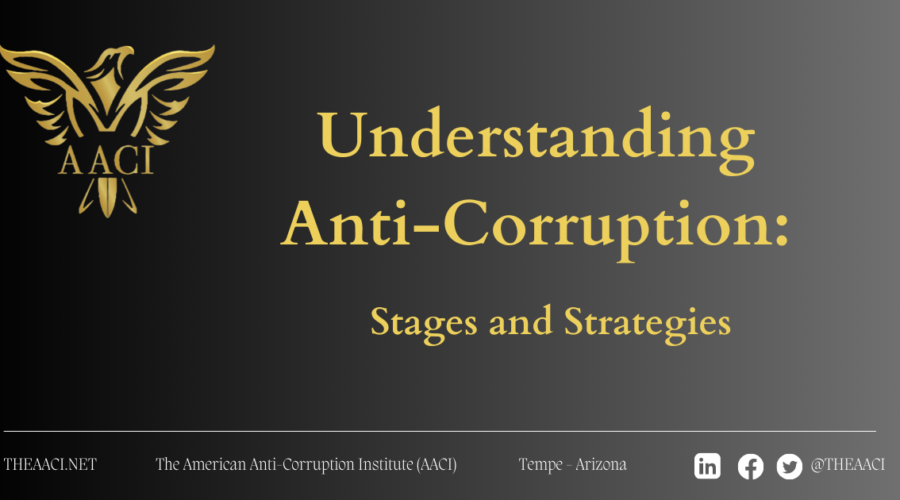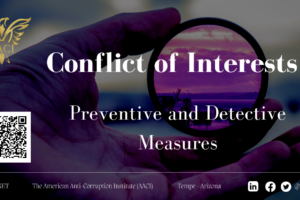November 27, 2023
Introduction
Corruption is a complex socioeconomic and political phenomenon against which nations and institutions must fight effectively and efficiently. Without properly combating corruption, countries and organizations will fail to achieve sustainable economic growth, good governance, and strong performance. However, a comprehensive understanding of corruption is a prerequisite for methodically and rigorously combating it.
What does “comprehensive understanding” mean in the context of fighting corruption? It signifies awareness, fundamental understanding, and advanced understanding regarding corruption. This three-part article aims to define the components of comprehensive understanding and provide strategies for each stage.
Stages of Comprehensive Understanding of Fighting Corruption
1. Awareness: This stage involves informing and educating stakeholders about the existence, nature, and detrimental impacts of corruption. It aims to raise consciousness regarding the various forms and manifestations of corruption within different contexts (political, economic, social, etc.) and its effects on society, institutions, and individuals. It may include campaigns, educational programs, and public discourse to sensitize people to the issue.
2. Fundamental Understanding: Here, the focus shifts towards developing a foundational comprehension of the root causes, mechanisms, and patterns of corruption. This involves understanding why corruption occurs, identifying its triggers, exploring historical and societal factors contributing to its prevalence, and comprehending how corruption infiltrates different sectors. It also includes understanding the legal and ethical frameworks in place to combat corruption.
3. Advanced Understanding: This stage deepens comprehension by delving into advanced strategies, methodologies, and interventions to combat corruption effectively. It encompasses the study of successful anti-corruption measures, innovative approaches, and the integration of technology, policy reforms, international cooperation, and multi-stakeholder engagement to create comprehensive anti-corruption frameworks. It involves equipping leaders, policymakers, and enforcement agencies with the tools, resources, and strategies to address the fundamental causes of corruption.
Each stage in fighting corruption is essential: without awareness, there can’t be a drive for change; without fundamental understanding, efforts may lack direction; and without advanced understanding, the solutions might not effectively address the issue’s complexities.
Awareness Strategies
The awareness stage in combating corruption is crucial as it sets the foundation for engaging stakeholders and fostering a collective commitment to address the issue. Here are some strategies within this stage:
1. Public Campaigns and Education: Launching public awareness campaigns through various mediums (TV, radio, social media, print) to inform and educate the general population about the detrimental impacts of corruption. These campaigns can highlight real-life examples, showcase success stories from anti-corruption efforts, and emphasize the benefits of a corruption-free society.
2. Community Engagement and Grassroots Initiatives: Engaging communities at the grassroots level by organizing workshops, seminars, and community meetings to discuss the local implications of corruption. Empowering individuals and community leaders to recognize, report, and resist corrupt practices within their spheres of influence.
3. Education Reform: Integrating anti-corruption education into school curricula to instill ethical values, integrity, and accountability from an early age. Teaching about the negative consequences of corruption and fostering a culture of transparency and integrity can help shape future generations.
4. Media Engagement: Collaborating with media outlets to highlight corruption cases, investigative reports, and success stories in fighting corruption. Media can play a significant role in shaping public opinion and holding authorities accountable.
5. Partnerships and Collaboration: Partnering with civil society organizations, NGOs, and international bodies to amplify the anti-corruption message. Collaborative efforts can enhance resources, expertise, and outreach, creating a unified front against corruption.
6. Government Transparency Initiatives: implementing initiatives that promote transparency within government institutions, open data initiatives, whistleblower protections, and accessible information about government operations and spending can help build trust and credibility.
7. Ethics Training and Corporate Responsibility: Providing ethics training programs in businesses and organizations to promote a culture of integrity and ethical decision-making. Encouraging corporate social responsibility and ethical business practices can contribute to a more ethical society.
Each of these awareness strategies aims to create a widespread understanding of the issue, encouraging active participation and support from various segments of society.











































